Serving 424 students in grades Prekindergarten-5, Whitney Elementary School ranks in the bottom 50% of all schools in Washington for overall test scores (math proficiency is bottom 50%, and reading proficiency is bottom 50%).
The percentage of students achieving proficiency in math is 28% (which is lower than the Washington state average of 40%). The percentage of students achieving proficiency in reading/language arts is 46% (which is lower than the Washington state average of 53%).
The student:teacher ratio of 13:1 is lower than the Washington state level of 16:1.
Minority enrollment is 77% of the student body (majority Hispanic), which is higher than the Washington state average of 52% (majority Hispanic).
Quick Stats (2025)
- Grades: Prekindergarten-5
- Enrollment: 424 students
- Student:Teacher Ratio: 13:1
- Minority Enrollment: 77%
- Overall Testing Rank: Bottom 50% in WA
- Math Proficiency: 28% (Btm 50%)
- Reading Proficiency: 46% (Btm 50%)
- Science Proficiency: 55-59% (Top 30%)
- Source: National Center for Education Statistics (NCES), WA Dept. of Education
Top Rankings
Whitney Elementary School ranks among the top 20% of public schools in Washington for:
Category
Attribute
Student Attention
School Overview
Whitney Elementary School's student population of 424 students has declined by 16% over five school years.
The teacher population of 32 teachers has grown by 6% over five school years.
Grades Offered
Grades Prekindergarten-5
Total Students
424 students
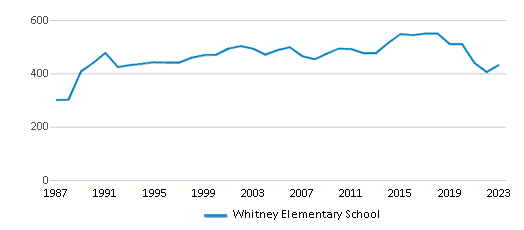
Gender %
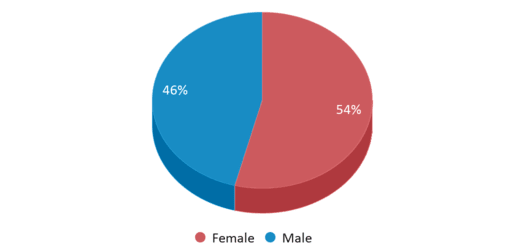
Total Classroom Teachers
32 teachers
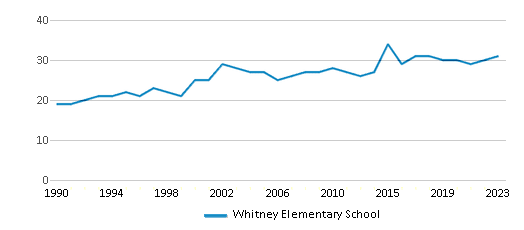
Students by Grade
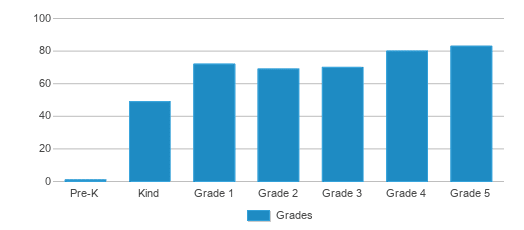
School Rankings
Whitney Elementary School ranks within the bottom 50% of all 2,113 schools in Washington (based off of combined math and reading proficiency testing data).
The diversity score of Whitney Elementary School is 0.46, which is less than the diversity score at state average of 0.69. The school's diversity has stayed relatively flat over five school years.
Overall Testing Rank
#1467 out of 2113 schools
(Bottom 50%)
(Bottom 50%)
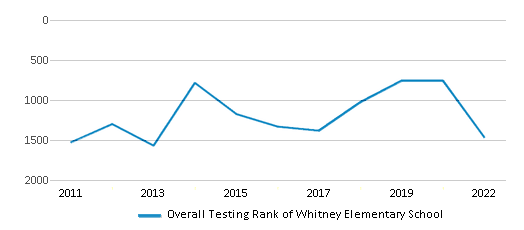
Math Test Scores (% Proficient)
28%
40%
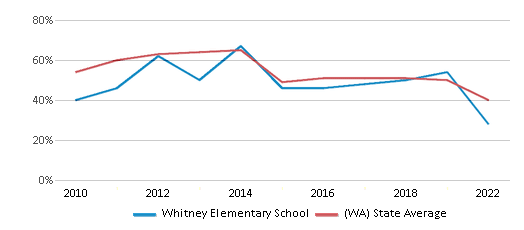
Reading/Language Arts Test Scores (% Proficient)
46%
53%
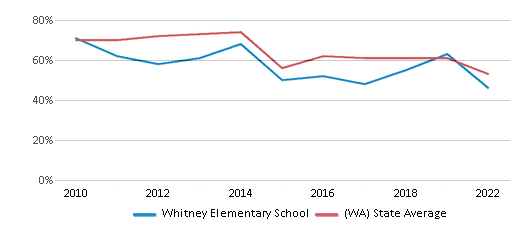
Science Test Scores (% Proficient)
55-59%
49%
Student : Teacher Ratio
13:1
16:1
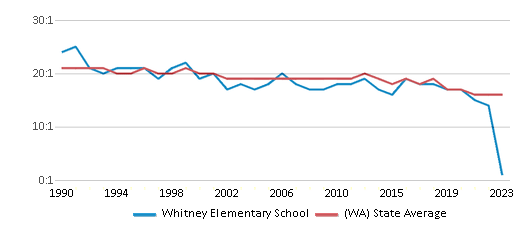
American Indian
1%
1%
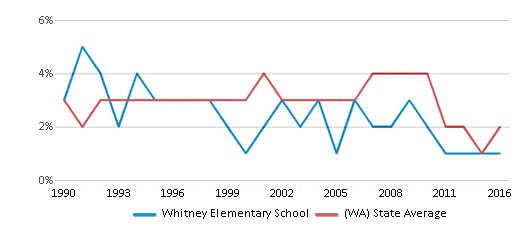
Asian
2%
9%
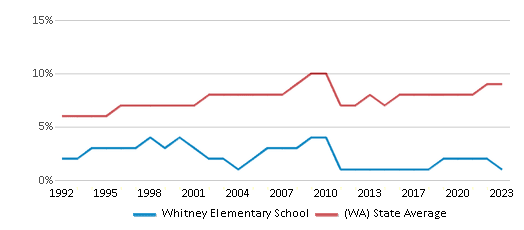
Hispanic
70%
26%
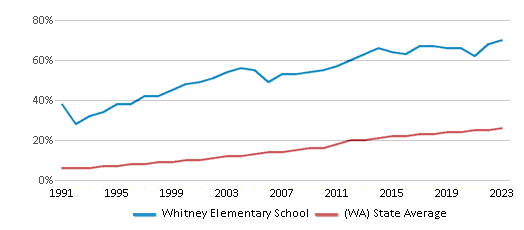
Black
1%
5%
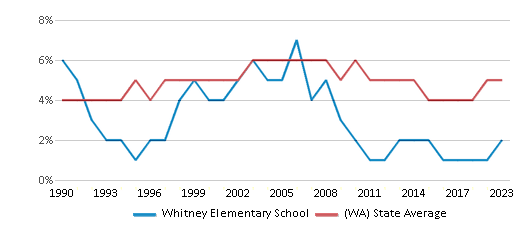
White
23%
48%
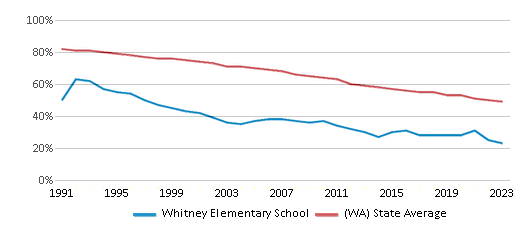
Hawaiian
n/a
2%
Two or more races
3%
9%
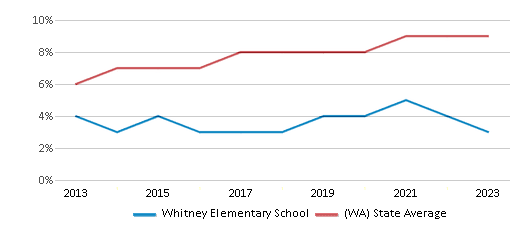
All Ethnic Groups
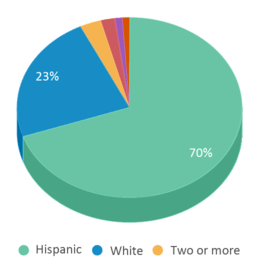
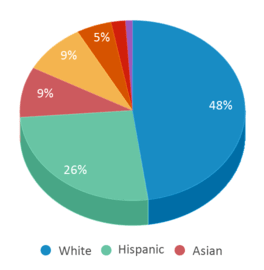
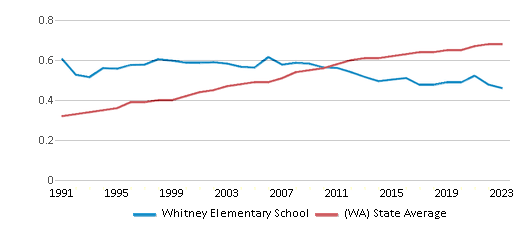
Eligible for Free Lunch
77%
49%
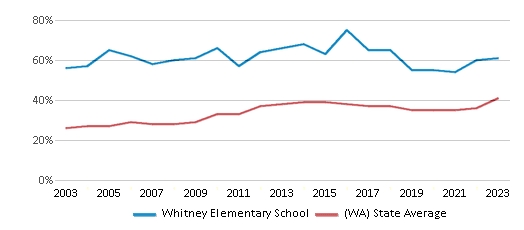
Eligible for Reduced Lunch
9%
8%
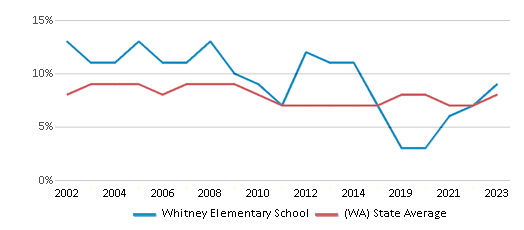
School Statewide Testing
School District Name
Source: National Center for Education Statistics (NCES), WA Dept. of Education
Frequently Asked Questions
What is Whitney Elementary School's ranking?
Whitney Elementary School is ranked #1467 out of 2,113 schools, which ranks it among the bottom 50% of public schools in Washington.
What percent of students have achieved state testing proficiency in math and reading?
28% of students have achieved math proficiency (compared to the 40% WA state average), while 46% of students have achieved reading proficiency (compared to the 53% WA state average).
How many students attend Whitney Elementary School?
424 students attend Whitney Elementary School.
What is the racial composition of the student body?
70% of Whitney Elementary School students are Hispanic, 23% of students are White, 3% of students are Two or more races, 2% of students are Asian, 1% of students are American Indian, and 1% of students are Black.
What is the student:teacher ratio of Whitney Elementary School?
Whitney Elementary School has a student ration of 13:1, which is lower than the Washington state average of 16:1.
What grades does Whitney Elementary School offer ?
Whitney Elementary School offers enrollment in grades Prekindergarten-5
What school district is Whitney Elementary School part of?
Whitney Elementary School is part of Yakima School District.
School Reviews
1 9/30/2019
For the last 3 years that my child had been attending the school, it breaks my heart to know that when bullying is brought to their attention they do nothing except blaming the child being bullied or brushing it off with that child is like that to everyone. The experience with this school has made my child grow to hate school which worries me to the core. No of the teachers that we have dealt with have been willing to listen and work with us when it came to my child and their solution to everything is put them on pills especially when the doctors and other instructors such as coaches and what not say the child does not need pills. I hope this review sheds light on the problems at hand and the school can re-evaluate it's the approach when it comes to dealing with all students.
5 9/12/2012
Mrs. Roberts is a wonderful teacher for kindergarten.. Other staff seem to be very welcoming and friendly. Its an all around great school i wish that the kids were nice to other kids and they enforced no bullying
Review Whitney Elementary School. Reviews should be a few sentences in length. Please include any comments on:
- Quality of academic programs, teachers, and facilities
- Availability of music, art, sports and other extracurricular activities
Recent Articles

What Is A Charter School?
Explore the world of charter schools in this comprehensive guide. Learn about their history, how they operate, and the pros and cons of this educational innovation. Discover key facts about charter schools, including admission policies, demographics, and funding, as well as what to look for when considering a charter school for your child.

10 Reasons Why High School Sports Benefit Students
Discover the 10 compelling reasons why high school sports are beneficial for students. This comprehensive article explores how athletics enhance academic performance, foster personal growth, and develop crucial life skills. From improved fitness and time management to leadership development and community representation, learn why participating in high school sports can be a game-changer for students' overall success and well-being.

February 05, 2025
Understanding the U.S. Department of Education: Structure, Impact, and EvolutionWe explore how the Department of Education shapes American education, from its cabinet-level leadership to its impact on millions of students, written for general audiences seeking clarity on this vital institution.





